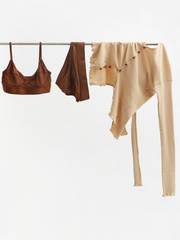Last year, we embarked on a project to find ourselves once more and define what Goodhood is, our purpose and what we want to stand for as we move forward into a new chapter of our life cycle. We began by defining our brand values of Conscious, Creative, Collaborative and Counter Culture. In this new series we take a deep dive into each of our cornerstone values.
At Goodhood we have a conscious point of view and a considered approach in the products we sell, the brands we source, the people we work with, the way we live our lives. We consider people care and earth care, and aim to be a force for good, both in supporting the creative communities and small sellers, and in our local and global communities. We encourage people to choose well, and buy less, make considered choices and think deeper than the prevailing narrative. Things which we practice ourselves as we try to understand complex problems that influence our company.
Conscious
What is conscious, and what does conscious mean to us? How do you practice consciousness within the clothing and goods production industry? As we develop our understanding of what it means to be conscious we want to explore this topic and try and share some of our insights and observations.
Conscious Culture
We believe in the shop being the highest cultural watermark. A place where culture intersects on many different dimensions, we have always thought of our store and its offer on a level with your favourite band putting out a record. It’s a place where music, visuals, smell and ambience all come together to create an experience that defines our culture as we know it. Our customers and community know they can come to our store and talk, make a friend, share an idea and treat it like a third place in their life, a place where culture assimilates for them and they assimilate our culture for us. One of our favourite conscious thinkers of the past, Terrance McKenna, stated 'the culture' is not your friend, and appealed to people to make their own culture. This has never been more pertinent with an increasingly centralised media filling your homes with trash ideas. We lovingly embrace the idea of us being the bearers of our own culture. Please join, all welcome.



Understanding Decentralisation
The UK economy is made up of small and medium sized businesses*. This is a natural representation of decentralisation. SME’s account for 99.9% of the business population. Small businesses contribute to the socio-economic fabric of communities by creating jobs, retaining wealth locally, and fostering a sense of community identity. Ultimately, the success of small businesses is intricately linked to the decentralisation ethos, emphasising autonomy, community involvement, and sustainable economic development. Put simply - if you spend your money with small / local / private businesses, your money is retained in an ecosystem that circulates amongst real people in real communities, rather than helping corporations transfer wealth upwards. Something worth thinking about!
*By UK Government definition within the private sector, a small business is 0-49 employees, and a SME is 50-249 employees. You can read more under Table C here (1).
"SMALL BUSINESSES CONTRIBUTE TO THE SOCIO-ECONOMIC FABRIC OF COMMUNITIES BY CREATING JOBS, RETAINING WEALTH LOCALLY, AND FOSTERING A SENSE OF COMMUNITY IDENTITY"

The Value of Goods
We all love a bargain. There’s no denying it. But what cost does discounting have on society and even our own culture. It will come as no surprise to our readers about the practice of discounting by mega players. Built on the idea of low margin, high volume it distorts the market place in favour of companies that can effectively loose money until they gain enough market share to monopolise the market. We’ve seen this play out with Uber around the world. Recently it’s been tried on the clothing industry.
Paying full price for goods is crucial as it not only supports fair compensation for producers and workers but also contributes to the sustainability of businesses. When consumers pay the full price, it helps maintain a balanced economy by fostering innovation, maintaining quality standards, and ensuring ethical business practices. Furthermore, it reinforces the concept of value exchange, where consumers receive a product or service commensurate with what they invest, promoting a healthier and more equitable marketplace for both producers and consumers. In short every shop you know and love cannot work on a discount model. Black Bird Spy plane does a good job of outlining the issues here (2).
"PAYING FULL PRICE FOR GOODS IS CRUCIAL AS IT NOT ONLY SUPPORTS FAIR COMPENSATION FOR PRODUCERS AND WORKERS BUT ALSO CONTRIBUTES TO THE SUSTAINABILITY OF BUSINESSES"
Here are some of the typical considerations when conscious shopping:

Mindful Consumer Choices
Being aware of your own consumption patterns and making intentional choices that align with your fundamental values as a person. This can involve avoiding impulsive purchases and considering the long-term impact of buying decisions. This type of decision making when consuming can be valid to products in a packaging that you don't need to buy more than once - hand soaps, shampoos, body washes, cleaning products. These kind of constant repeat purchases often have environmentally-friendly alternatives; businesses and brands that offer the option of keeping the bottle forever and repeat purchasing the contents of that bottle. Mindful consumer purchases is also applicable to even needing that product in the first place. All in all, taking a considered approach to your purchases.
Focusing on the longevity and durability of products rather than pursuing constant, disposable consumption and fast fashion. This often involves investing in higher costing, but importantly significantly higher quality items that are built to last, reducing the need for frequent replacements. Buy better, buy less. Buy once, use forever.


Timeless Product and Future Classics
Timeless products and future classics are items that are season-less and built to last. Often an investment product, or a future grail, it's an item that isn't lead by industry trends, it doesn't 'go out of fashion', and it'll serve you long-term. The price per wear is an interesting discussion with timeless products and future grails. You buy the Wacko Maria x Larry Clark Hawaiian Shirt released in 2021. Say you wear it every summer a couple of times a week, and keep it for years and years to come. The big price tag when you first purchased that shirt suddenly seems a lot smaller. If you buy a cheap shirt from a shop associated with fast fashion that produce trend-based products, chances it won't see a second summer. All of these points suggest that timeless product isn't an impulse buy, and you would take a considered approach to purchasing.


Conscious Production and Organic Goods
In the context of clothing production, the term "organic" refers to a method of cultivating and processing textiles without the use of synthetic chemicals, pesticides, or genetically modified organisms. Organic clothing is produced using environmentally friendly practices that prioritise soil health, biodiversity, and water conservation. Certified organic textiles often adhere to stringent standards set by organisations like the Global Organic Textile Standard (GOTS). This certification ensures that the entire supply chain, from farming to manufacturing, meets strict ecological and social criteria. Organic clothing aims to minimise environmental impact, reduce exposure to harmful chemicals for both workers and consumers, and promote sustainability in the fashion industry by embracing natural, renewable resources and ethical production practices.
Organic clothing is clothing made from materials raised in or grown in compliance with organic agricultural standards. Organic clothing may be composed of cotton, jute, linen, silk, ramie, or wool.
Environmental Impact & Social Considerations
Considering the environmental footprint of products, including their production, transportation, and disposal. This may involve choosing products with sustainable sourcing, minimal packaging, recyclable packaging, and energy-efficient manufacturing processes. Retailers, brands and businesses that take into account ethical practices, such as fair labor conditions, human rights, and social responsibility. Investing and buying from businesses that follow these practices can directly support staff, suppliers and manufacturers, and the local economy in which that business operates in. What does a business that takes ethical and social morals into consideration look like? It can look like fair wages for employees, fair trade with suppliers from farming to manufacturing, good working conditions and only using suppliers with good working conditions, sick pay for employees. Preferring brands and businesses that demonstrate a commitment to social and environmental responsibility. This may involve researching a company's values, certifications, and practices before you buy, ensuring you're spending your money is ethical and positive places. The more you spend money at companies with these values, the longer and better these business can operate. Support a business that supports their people - your money will go further than you may initially think.
(1) Author(s): British Government, Title of the article: Business population estimates for the UK and regions 2023: statistical release, Publication or Website Name: https://www.gov.uk/government/statistics/business-population-estimates-2023/business-population-estimates-for-the-uk-and-regions-2023-statistical-release
(2) Author(s): Blackbird Spyplane, Title of the article: Is SSENSE Hurting the Cool Clothes Ecosystem?, Publication or Website Name: Blackbird Spyplane URL: https://www.blackbirdspyplane.com/p/is-ssense-hurting-the-cool-clothes-ecosystem









































































































